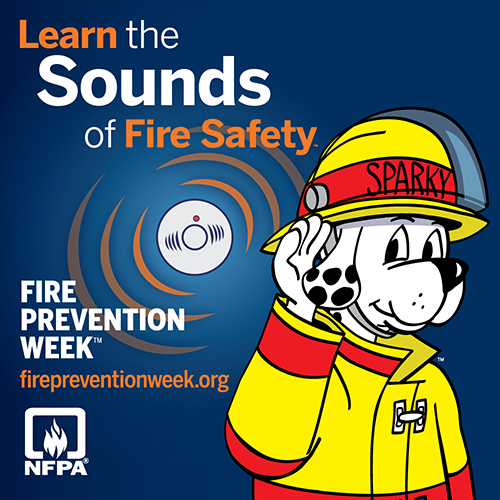September 23, 2021 – The National Fire Protection Association (NFPA), the official sponsor of Fire Prevention Week™ for 99 years, has announced “Learn the Sounds of Fire Safety™” as the theme for Fire Prevention Week, October 3-9, 2021. From beeps to chirps, this year’s campaign works to better educate the public about the sounds smoke alarms make, what those sounds mean, and how to respond to them.
“Smoke alarms have played a leading role in reducing fire death rates over the past 40 years, but we still have more work to do in maximizing their effectiveness,” said Lorraine Carli, NFPA vice president of Outreach and Advocacy.
According to the latest NFPA “Smoke Alarms in the U.S.” report, working smoke alarms in the home reduce the risk of dying in a reported fire by more than half (55 percent). However, almost three out of five home fire deaths occur in homes with no smoke alarms (41 percent) or smoke alarms that failed to operate (16 percent); missing or non-functional power sources, including missing or disconnected batteries, dead batteries, and disconnected hardwired alarms or other alternate current (AC) power issues, are the most common factors when smoke alarms fail to operate.
“When the smoke alarms in your home beep or chirp and you can’t figure out why – or how to make them stop – it can be frustrating. All too often, that frustration leads people to remove the batteries from their alarms or dismantle them altogether,” said Carli. “These actions place people at serious risk in the event of a home fire.”
This year’s Fire Prevention Week theme, “Learn the Sounds of Fire Safety,” helps people better understand the reasons smoke alarms may sound and the know-how to effectively address them, helping ensure that smoke alarms remain in working order. The campaign also addresses special considerations for the deaf and hard of hearing, along with information about carbon monoxide alarms.
“Giving people the tools to properly respond to alarms sounding – whether it’s an actual fire or simply time to change a battery – can make a life-saving difference,” said Carli.
Key messages for “Learn the Sounds of Fire Safety” include:
- When a smoke alarm or carbon monoxide (CO) alarm sounds, respond immediately by exiting the home as quickly as possible.
- If your alarm begins to chirp, it may mean that the batteries are running low and need to be replaced. If the alarm continues to chirp after the batteries are replaced, or the alarm is more than 10 years old, it is time to replace the alarm.
- Test all smoke and CO alarms monthly. Press the test button to make sure the alarm is working.
- If there is someone in your household who is deaf or hard of hearing, install bed shaker and strobe light alarms that will alert that person to fire.
- Know the difference between the sound of a smoke alarm and a carbon monoxide alarm – three beeps for smoke alarms; four beeps for carbon monoxide alarms.
For more information about Fire Prevention Week, October 3-9, 2021, and this year’s theme, “Learn the Sounds of Fire Safety,” along with a wealth of resources to help promote the campaign locally, visit fpw.org.
About Fire Prevention Week™
NFPA has been the official sponsor of Fire Prevention Week™ since 1922. According to the National Archives and Records Administration’s Library Information Center, Fire Prevention Week is the longest running public health and safety observance on record. The President of the United States has signed a proclamation declaring a national observance during that week every year since 1925. Visit www.firepreventionweek.org for more safety information.
NFPA®: 125 Years of Protecting People and Property
The National Fire Protection Association® (NFPA®) is a global self-funded nonprofit organization devoted to eliminating death, injury, property, and economic loss due to fire, electrical, and related hazards. The association began its work to solve the fire problem in a young, industrialized nation in 1896 and is recognized around the globe as a leader in advocating for safety. NFPA delivers information and knowledge through more than 325 consensus codes and standards, research, training, education, outreach, and advocacy; and by partnering with others who share an interest in furthering the NFPA mission. In celebration of its 125th Anniversary, NFPA will be hosting a Conference Series and other initiatives that reflect the steadfast commitment to advancing fire and life safety by the association for the next 125 years and beyond. For more information or to view NFPA codes and standards for free, visit www.nfpa.org.









